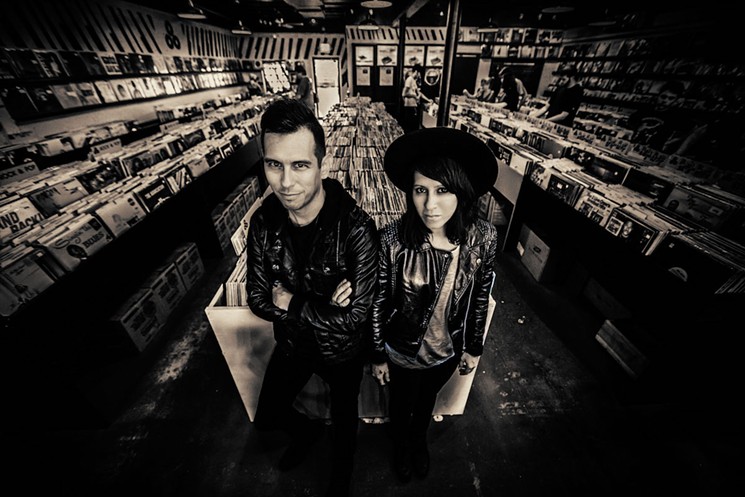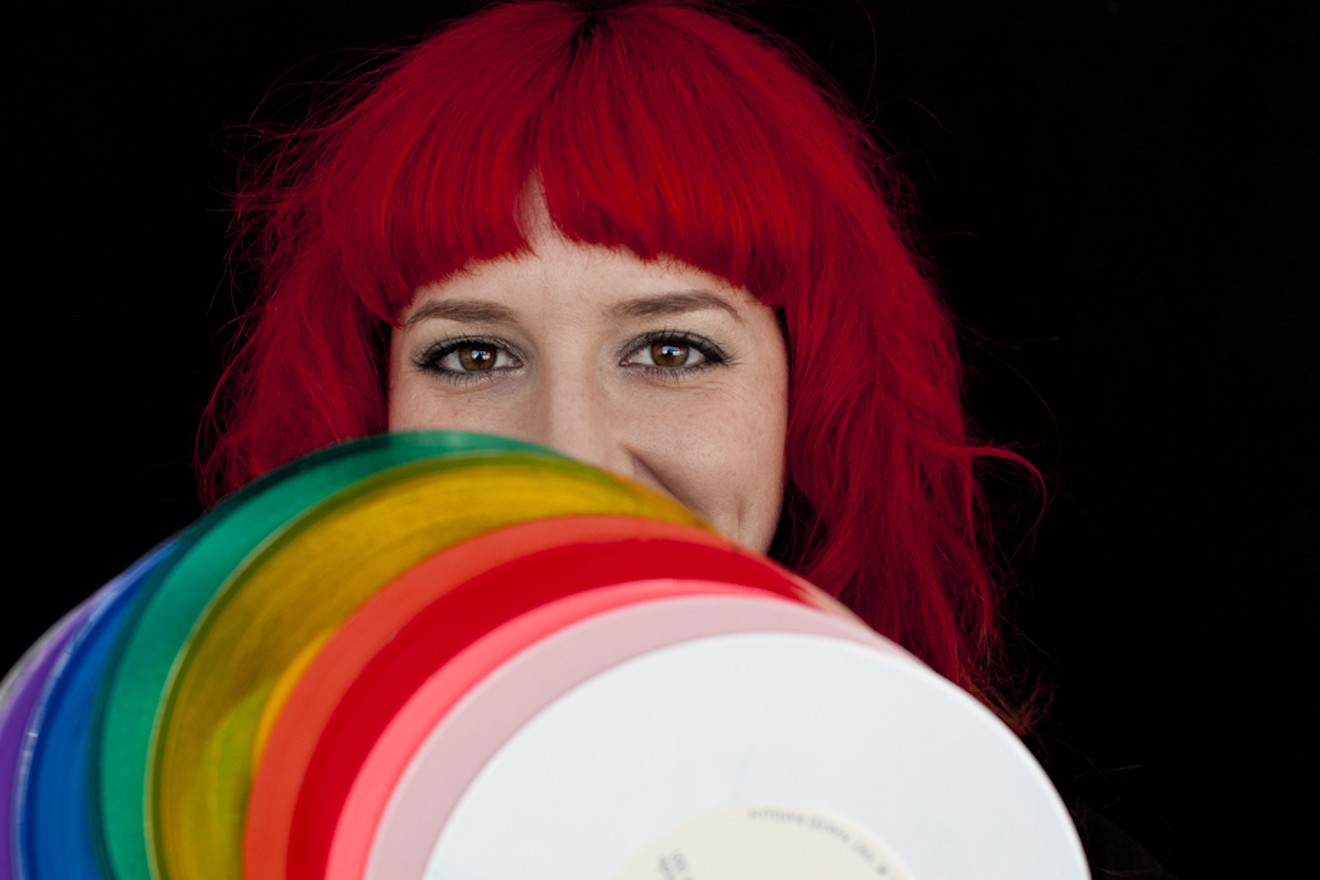This year, if you can find them, you can nab limited releases by Animal Collective, André 3000, Blowfly, David Bowie, Deee-Lite, Lil Uzi Vert, Red Hot Chili Peppers, Sia, and many others.
But beyond Record Store Day, South Florida's independent shops persist, providing customers the satisfaction that only holding and playing a physical release can give. It can't be easy running a record store in an age when services such as Spotify, Tidal, and Apple Music are readily available — and portable. Perhaps nobody knows these struggles better than Lauren "Lolo" Reskin of Sweat Records in Little Haiti and Mikey Ramirez of Radio-Active Records in Fort Lauderdale.
New Times asked Reskin and Ramirez to sit down together and talk to each other about what it's like to run a record store in 2017. Here's their conversation, edited for length and clarity.
Lolo: First record store job? Mine was at Virgin. But even before Virgin Megastore opened, every time I was in a CD store, I would alphabetize things because I just couldn't help myself. So Spec's, Best Buy, and the Barnes & Noble in my area of Kendall were probably a little cleaner because of me as a young nerd who really wanted to play with records all day. But, yeah, Virgin was my first place of employment officially and my dream job at the time, and really was a dream come true and the best thing that could have happened to me in high school. I worked there for six years.
Mikey: Mine was Barnes & Noble — that's the first job where I actually got paid. But when I lived in Coral Springs, I lived across the street from Sid's Records & Tapes, and I would always go over with whatever pocket change that I had and buy records, CDs, silver-backed bootlegs, and all that stuff. And then there were times when I would just go there and hang out. And there was a gentleman there, I can't remember his name, but he said, "If you're gonna hang out here all day, you're gonna do something." So he gave me the broom. I had to sweep, and at that time, before Sid's moved to Peppertree Plaza, it was a huge store. There was a lot of dust, and no one ever cleaned there. So that was the first time I actually was involved in a record store. There was no pay, but it didn't matter because I was immersed in all the materials.
Lolo: And you got to hang out?
Mikey: Yeah, I did. I felt cool at a very uncool time in my life. But I think everyone has to start somewhere like that. I don't think you just wake up and decide, OK, I'm gonna have a record store. You have to work your way through the trenches.
Lolo: Yeah, and you have to realize that this is what you want to do, because it's a huge commitment, and it's not for everyone.
Mikey: What would you say your challenges have been with Sweat over the past ten years that people wouldn't necessarily know that would be a problem? Things that you deal with that they wouldn't know about.
Lolo: Especially as vinyl has gotten just more and more popular and in the media and the mainstream, we do a lot of education, and it takes up a lot of time. We do everything from explaining to people on a daily basis the difference between original press, first press, reissue, etc., all the different terminologies, to how to drop a needle onto a record, on the player, and the names of the different parts of a record player. There's a huge educational aspect to it, and it does actually take up a lot of our time. It can be challenging sometimes when people assume things. I'm sure you get this too, where people walk in assuming you've got first editions of every classic album that ever came out just sitting there waiting for them at bargain-basement prices, when that's not really the case. Music has one of the slimmest markup margins in retail. So we have to hustle a lot harder than your average owner of a clothing boutique or a candy shop or some other sort of retail establishment.
Mikey: I didn't even know this till maybe a couple of years ago, but the markup on clothes is huge.
Lolo: Yeah. One hundred precent base, pretty much.
Mikey: For new vinyl, your base is 30 percent. That's not much. So if we're buying a record from an artist that's $24.95 retail, there's a big misconception that that $24.95 is going directly into our pockets, and that's not true.
Lolo: First off, you paid over $15 for it.
Mikey: Oh, way over $15. There's very little profit that we make on that. It's what we have to live with, because at the same time, you have a new contingent of buyers coming in now who aren't necessarily looking for older records. They want new records from new artists, or they just want new pressings. But fortunately, those pressings are no longer $8.99 or $9.99 like they were 30 years ago.
Lolo: We're definitely working on our end to keep the records at a good price, and we really appreciate the people who come in and opt to spend their record money in our stores as opposed to buying online, because I just think it's more fun to buy records in real life.

Mikey Ramirez of Radio-Active Records (left) and store manager Natalie Martinez
Courtesy of Radio-Active Records
Lolo: The serendipity feeling of "Oh, my God, the universe conspired to put this in my hands today. It's coming home with me, and now it's mine."
Mikey: It's to the point now where you have too much information. You can get swallowed up very easily. It's like going on YouTube, getting lost on YouTube.
Lolo: Right, or there's everything in the world on Spotify, but then there's a playlist you follow that you like a lot. And going into a record store in real life is saying, "Oh, cool, these people have handpicked this selection of records for me to look at in real life. This makes it a lot easier for me and is exciting, fun, tactile, interesting, and something to do for the day."
What do you find most enjoyable about owning a record store?
Mikey: Oh, the people. I remember this one person who was just not having a good day. We did a Front Bottoms in-store. The girl couldn't make it, and she was in the store later picking up a Front Bottoms record, and she's like, "I'm so bummed out I couldn't be here... Things haven't been going well for me lately."
I'm like, "Oh, I'm really sorry." And I know she had the record in her hands, and then, down below, we had a signed copy of the record, and we were gonna do some giveaway with it.
And then she looked up on the top shelf and there was a box set she wanted. It might have been the Bright Eyes box set; I can't remember what it was. She's like, "Oh, my God, I want that, but I can't afford both." I said, "Well let me get this down." I got it down for her. She said, "I don't know what to do; I don't know what to do."
I go, "I'm gonna tell you something. You're gonna buy this box set. You're not gonna buy this Front Bottoms record because I'm gonna give this to you because you missed the show, and I know you really appreciated it." And the girl — I'm not trying to put her on blast, but it was like waterworks. She just cried. I said, "Oh, it's OK; it's all right. Don't worry about it. This is for you. You'll appreciate this."
To do things like that, to see people really be appreciative of what you're doing, and just to make your mark in that community, that's everything to me. To me, that's a million dollars.
Lolo: Buying records can make you feel better.
Record Store Day 2017
8 a.m. to midnight Saturday, April 22, at Sweat Records, 5505 NE Second Ave., Miami; 786-693-9309; sweatrecordsmiami.com.
8 a.m. to 9 p.m. Saturday, April 22, at Radio-Active Records, 845 N. Federal Hwy., Fort Lauderdale; 954-762-9488; radio-active-records.com.












